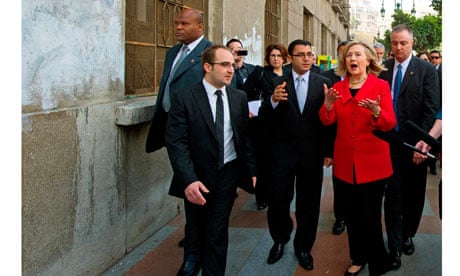The Obama administration's inaction might have stymied David Cameron's diplomatic push for a no-fly zone over Libya, but there is nevertheless one aspect of diplomacy where the Cameroons still think the Obama administration is leading the way.
Diaries were cleared in Downing Street and the Foreign Office recently for meetings with two Americans who tweet for their country. You might not have heard of them, but through Twitter the Arab protesters monitor their every tweet. Even though Cameron was readying Whitehall for armed action – the men, Alec Ross and Ben Scott, got the best pomp the government boasts.
They breakfasted with the prime minister's chief of staff Ed Llewellyn, met a pretty busy William Hague, and wound up that evening with a meeting with the Foreign Office's head of strategy Alex Ellis and No 10 strategy chief Steve Hilton.
Ross probably became most famous for inflaming America's diplo-establishment when he and a colleague sent tweets considered frivolous (about how good the frappuccino was) on a rare highly charged trip to Syria. Equally the prime minister once declared: "Too many tweets make a twat." But here was the government welcoming them.
In terms of followers, Ross is the third most important member of the administration and he also works for Hillary Clinton, the godmother of the "21st-century statecraft" initiative – a philosophical tract on how the internet has changed international relations.
Though there seems to be some tension between Clinton's more muscular pronouncements on Libya and Barack Obama's, the subliminal message of Ross's trip might also explain the "Obama no-drama" foreign policy: he'd quite like to see soft power beat hard power on his watch. The Foreign Office is interested in this.
After being caught off guard by the demonstrations in Egypt, their US counterparts decided to correct that quickly. They persuaded Clinton to hold a live webchat with the protesters in Tahrir Square. Once, an address by the secretary of state to people miles away was a far-fetched idea.
Twitter means that reactions can be quicker, enabling America to clarify its intent. When they saw that al-Jazeera had been closed down in Egypt, Ross and Scott tweeted State dept outrage direct to Arabs; and, using hash tags held up on placards by protesters, the US targeted their rebuttal.
Nor is tweeting a replacement for the diplomatic telegram. Ben Scott used analytical tools to ascertain exactly what type of people were involved in the Egyptian and Tunisian uprisings.
For Obama tweets are a stick to poke into the revolving wheel of the Middle East to help it spin when it slows, but never to start or finish it.
So diplomats and cabinet ministers here also want to upgrade their "humint". One cabinet minister reports that a few weeks before Mohamed Bouazizi set fire to himself in Tunisia, the Foreign Office circulated a memo saying they believed Tunisia to be stable. Looking back on it now, the minister who had handled the memo said they felt the diplomat who had written it was perfectly competent.
And their point is, diplomats are good at their jobs – they just need the new tools to spot things the fax machine is not receiving.
"The absence of a technology-savvy figure did influence our policy," a Whitehall source says. "We needed a 'digital native' in all the big meetings in the Foreign Office and national security council – and we didn't have one."
A few weeks ago, Ed Llewellyn asked for British candidates to do the job. Ben Hammersley - a troubadour who gets the FCO but can also write internet code - was the only outsider invited to the government meetings with Ross and Scott, a heavy hint.
Plans are now being hatched for a digital rapid-reaction force. In the future when a Mubarak takes down a server, the UK would aim to have the ability to route it elsewhere and keep people afloat on social media.
The software exists for the government to reconnect the rebels in eastern Libya to the internet after Gaddafi took it down. Similarly, we know the US is investing in software that, when it's developed, would give allow dissidents in China to encrypt their messages.
Should the FCO pass this, or similar tools, to rebels in a revolution? It would be "liberal intervention", but not as we know it and would fit with the post-Iraq desire to avoid military entanglements.
In his meeting with the Americans, Hilton pointed out that America only latterly decided to turn against the Mubaraks of this world. "We need to be more ambitious," he said – suggesting the technology should not just be used reactively, but proactively.
The tension with this position, he was told, is that it is difficult to be "more ambitious" without taking Pakistan into your purview – a country with nuclear capabilities. Bahrain also presents headaches. But more generally, although conservatives might blanche, this is the direction of travel.
While Llewellyn and Hague battle with Obama over Libya, Clegg and others think their time will be better spent devoted to Egypt and Tunisia.
The deputy prime minister is known to argue in favour of Egypt taking more than six months before elections, enabling civil society to organise.
A muscular knowledge of and support for social networks might help them to help Egyptians and Tunisians.
Downing Street and diplomats are in agreement. One said: "We need to encourage them to step our way. Just as support was offered to the former communist countries we also need to be showing them what a democratic country looks like. Social networks make this much easier."
The FCO already tweets, but the point of the Ross-Scott trip was about more than just introducing 140-character diplomacy. Opening up data and reform of one of the great offices of state. It's not hard to see why one MP recently said: "The big society has been exported to Egypt."
